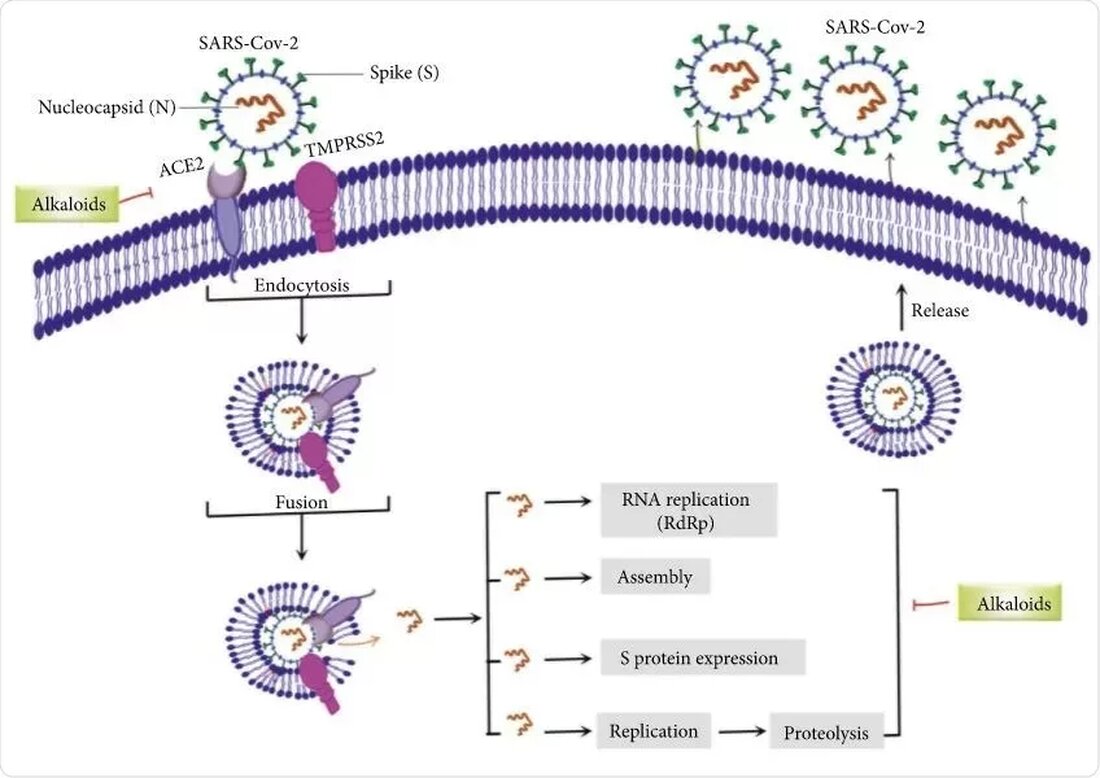Alkaloids as potential phytochemicals against SARS-CoV-2: starting points for the associated central mechanisms
Alkaloids as potential phytochemicals against SARS-CoV-2: Approaches to the key mechanisms involved Alkaloids are nitrogen-containing phytochemicals found in plant families such as Amaryllidaceae, Apocynaceae, Papaveraceae, Asteraceae and Solanaceae and have potential biological and pharmacological properties have effects. Many alkaloids found in the human diet are found in coffee seeds (caffeine), cocoa seeds (theobromine and caffeine), tea leaves (theophylline and caffeine), tomatoes (tomatine), and potatoes (solanine). Alkaloids are known to be effective in treating various diseases such as neurological diseases, cancer, metabolic diseases and infectious diseases. These secondary plant metabolites also have a significant effect on viruses such as influenza viruses, herpes simplex virus, human immunodeficiency virus and hepatitis C virus. To...

Alkaloids as potential phytochemicals against SARS-CoV-2: starting points for the associated central mechanisms
Alkaloids as potential phytochemicals against SARS-CoV-2: Approaches to the key mechanisms involved
Alkaloids are nitrogen-containing phytochemicals found in plant families such as Amaryllidaceae, Apocynaceae, Papaveraceae, Asteraceae and Solanaceae and have potential biological and pharmacological effects. Many alkaloids found in the human diet are found in coffee seeds (caffeine), cocoa seeds (theobromine and caffeine), tea leaves (theophylline and caffeine), tomatoes (tomatine), and potatoes (solanine).
Alkaloids are known to be effective in treating various diseases such as neurological diseases, cancer, metabolic diseases and infectious diseases. These secondary plant metabolites also have a significant effect on viruses such as influenza viruses, herpes simplex virus, human immunodeficiency virus and hepatitis C virus.
To further study these organic compounds, researchers from Kermanshah University of Medical Sciences (Iran) and Universidad de Santiago de Chile (Chile) examined the role of alkaloids as potential antiviral agents against severe acute respiratory syndrome coronavirus 2 (SARS-CoV-2). They presented the chemistry, plant sources and antiviral effects of alkaloids as well as their anti-SARS-CoV-2 effects.
This review was published in the journal Evidence-Based Complementary and Alternative Medicine.
Despite countless efforts to find therapeutic drug candidates for COVID-19 disease, there is still no effective solution for prescription by healthcare professionals. To date, over 176 million infections have been attributed to SARS-CoV-2 and over 3.8 million people have died worldwide. Finding a drug to control the disease is the ultimate goal of scientists and doctors around the world.
Despite intensive research, the inherent nature of SARS-CoV-2 infection and its pathogenesis makes the search for an effective drug complex and impossible.
Main targets of alkaloids in the fight against SARS-CoV-2
Looking towards plant-based compounds, previous in vitro and in silico studies have shown significant effects of alkaloids against coronaviruses, particularly SARS-CoV-2. The authors summarized all the evidence for the antiviral, neuroprotective, antipyretic and anti-inflammatory effects of alkaloids.
“Lycorine as well as other alkaloids such as tetrandrine, harmine, conessine and emetine showed antiviral activities against HCoVs such as HCoV-OC43 and HCoV-NL63.”
The review presents a list of alkaloids based on in vitro and in silico studies with potential anti-SARS-CoV-2 activity - along with chemical structure, mechanism of action, study type and references.
Alkaloids contain nitrogen atoms in negative oxidation state in their structure. These are responsible for their alkaline properties, which are associated with therapeutic effects.
While the virus uses various mechanisms such as inhibition of the main protease (Mpro) and RNA-dependent RNA polymerase (RdRp) as well as interaction with coronavirus-associated structural proteins, alkaloids interact with the coronavirus-associated structural proteins as well as the non-structural angiotensin converting enzyme 2 (ACE2) in the cell membrane and inhibit RdRp and 3-chymotrypsin-like protease (3CLpro).
With regard to the fight against SARS-CoV-2, researchers discuss the main targets of the alkaloids: ACE2, TMPRSS2 (transmembrane serine protease 2) and RNA replication, assembly, S protein expression and proteolysis.
The researchers noted that several clinical trials are underway on alkaloids such as colchicine (NCT04527562, NCT04392141, NCT04375202, NCT04355143 and NCT04360980), berberine (NCT04479202) and tetrandrine (NCT04308317). Many alkaloids have been shown to be highly effective anti-SARS-CoV-2 agents.
“According to the antitussive activities of thalimonine and the antirhinoviral activities of sophalin D, these alkaloids are promising candidates for the treatment of COVID-19.”
In this review, researchers conclude that alkaloids offer hope for an effective treatment against COVID-19 as they have simultaneous effects on multiple therapeutic targets with outstanding antiviral effects.
“Marine/Plant-derived alkaloids such as berberine, tetrandrine, cepharanthine, lycorine, ergotamine, crambescidine 786, palmatine, noscapine and quinine with outstanding anti-SARS-CoV-2 effects along with antipyretic, anti-inflammatory, antitussive and antipulmonary, immunomodulatory as well “Protective effects on neurotoxicity, cardiotoxicity, nephrotoxicity and hepatotoxicity could be promising candidates for the treatment of COVID-19,” the researchers summarize.
Comprehensive and comprehensive studies on the alkaloids mentioned in the review could be helpful in combating this pandemic and future emerging pandemics as well.
"Cepharanthin ameliorated lung injury, a critical complication of COVID-19, with effects on inflammatory signaling pathways. Therefore, cepharanthin may be a promising candidate in the fight against COVID-19."
Source reference:
“Alkaloids as Potential Phytochemicals against SARS-CoV-2: Approaches to the Associated Pivotal Mechanisms,” Evidence-Based Complementary and Alternative Medicine, Volume 2021

 Suche
Suche
 Mein Konto
Mein Konto
